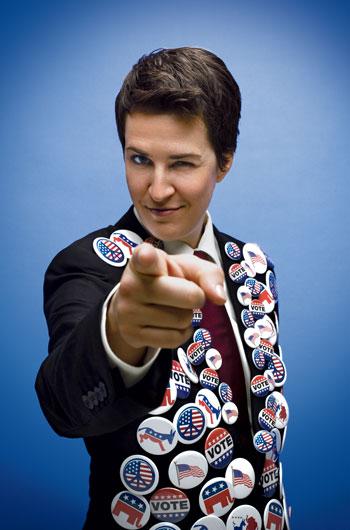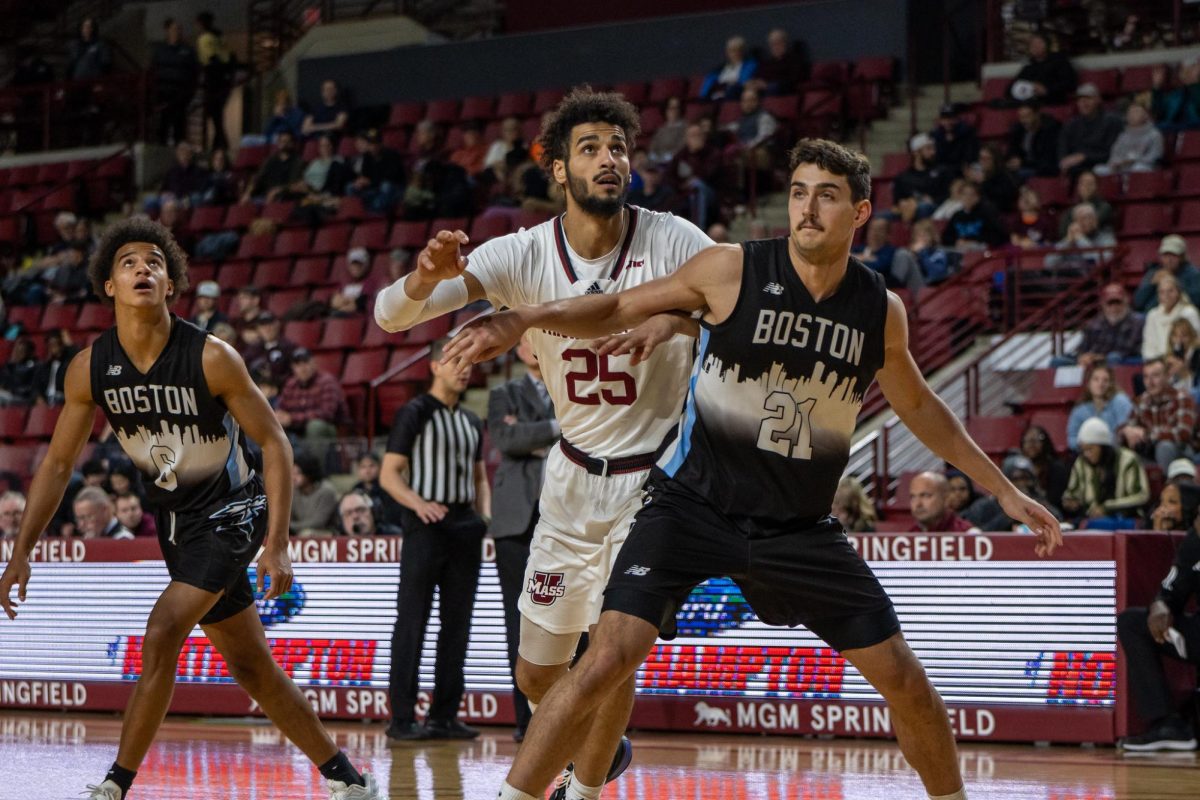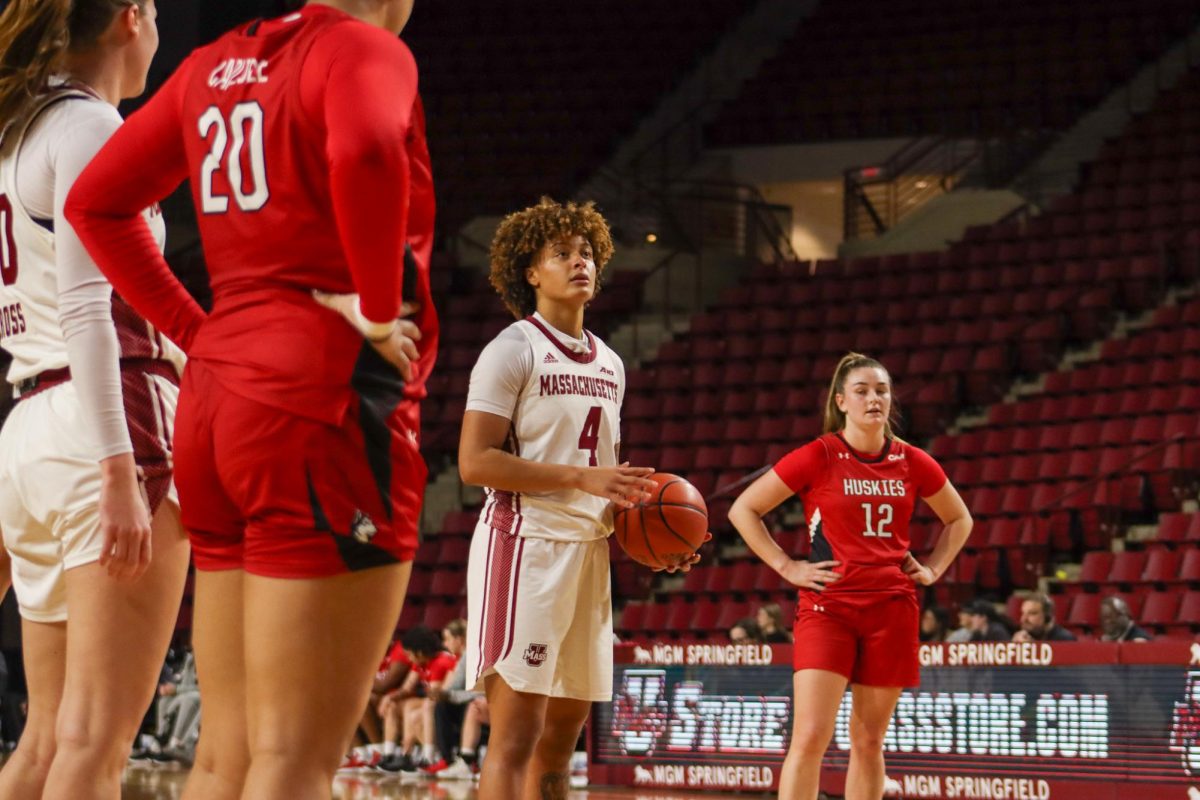 Courtesy Maddowonline.com
Courtesy Maddowonline.com Courtesy Maddowonline.com
Courtesy Maddowonline.comIt’s about 10:30 p.m. in New York and Rachel Maddow has just finished her nightly television gig at the MSNBC studio in Rockefeller Center, but she’s still very much “wired.” Now, she just desperately wants to cop some z’s.
“If I don’t get to sleep by midnight, the prospects for a good night’s rest are about one in a million,” she says in a phone interview while walking briskly along Sixth Avenue toward her apartment. “I might as well hit myself over the head with a ball-peen hammer.”
It’s a wonder that Maddow, a Castro Valley, Calif., native and Stanford grad, can sleep at all these days. The relentless blur that is her life consists of daily anchoring duties for the “Air America” radio network and blogging assignments for the Huffington Post. She is also penning a book on the heavy topic of American militarism since 1989.
But the job generating the most buzz is one she has held for only a few weeks. As the liberal-minded, John McCain-bashing host of “The Rachel Maddow Show” on MSNBC, she has boldly bolted into the cable-TV boys club of political punditry while racking up mostly rave reviews and robust ratings.
“She has supernatural reserves of energy,” says Bill Wolff, Maddow’s executive producer. “She works harder and longer than anyone I’ve ever known.”
She’s also got smarts to spare. Maddow, 35, is a Rhodes scholar with a doctorate in political science from Oxford. A lesbian who came out at the age of 17, she wrote her dissertation on AIDS activism in prisons.
“She’s pretty unreal,” Wolff marvels. “Intellectually, she kind of runs laps around everyone.”
Maddow warmed up for her current assignment with regular guest bookings on CNN and MSNBC, including the network’s top-rated program, “Countdown with Keith Olbermann.” After watching her more than hold her own with the likes of Chris Matthews, Tucker Carlson, Olbermann and others, MSNBC execs concluded it was time to let her fly solo.
She is the first openly gay woman with a national news program, yet she doesn’t even own a TV.
“It’s not any kind of intellectual snobbery,” says Maddow, who splits her time between New York and the Massachusetts home she shares with artist Susan Mikula, her partner of nine years. “It’s more of a constitutional weakness. When the TV is on, I can’t get anything done.”
But plenty of people are watching her. Since launching on Sept. 8, “The Rachel Maddow Show” has doubled the ratings of Dan Abrams, the previous occupant of the time slot. Even more impressive, it has occasionally bested the Nielsen numbers of Olbermann and CNN’s Larry King.
The keys to her success? Maddow blends that impressive intellect with a quick wit, a refreshing calmness and engaging smile. Like other unabashedly partisan cable-TV commentators, she leads emphatic cheers for her side, but does so with a touch of self-deprecation and a disarming brand of charm.
“There’s a sardonic quality to her, but she’s not mean-spirited,” says Tom Rosenstiel, director for the Project for Excellence in Journalism. “The nastiness is missing. She obviously knows how to connect with her audience.”
And behold her motto: “Mind over chatter,” a firm rebuttal to the obnoxious shouting matches that plague cable television. As a rule, only one guest appears on Maddow’s show at a time, thereby cutting down on the din.
“I’m just trying to pay back the universe,” she says of the show’s gift of less gab.
That doesn’t mean Maddow runs from a fight. She admittedly loves to argue (“Going toe-to-toe and hashing things out is fun”) and one of her favorite foes is arch-conservative Pat Buchanan, who appears regularly on the show.
“The fact that he will come and spar with me with such a generosity of spirit is great – even though I think 85 percent of his views are toxic,” she says.
Maddow and Buchanan might be the oddest of couples. At 19, she watched the 1992 Republican National Convention on television in tears as he denounced gay rights in a fiery culture-war speech that rocked her to her core.
“It was like he was declaring that my own country was at war with me,” she recalls. “Now, I get it intellectually and strategically, but at 19, I only got it emotionally.”
Apparently, all is forgiven. When they’re not tussling for the cameras, Maddow and Buchanan often chat up their mutual love of spy movies. And on the refrigerator in the Castro Valley home of Maddow’s parents is a photo of the two of them posing arm in arm.
“It’s a kick,” says Bob Maddow, an attorney with an office in Walnut Creek, Calif. “They couldn’t be more diametrically opposed, but they have a healthy respect for one another.”
Bob and his wife, Elaine, admit it’s “surreal” to see their daughter beaming all over television (she appeared on “The Tonight Show With Jay Leno” last week). But they knew early on they weren’t raising a typical child.
Rachel’s interest in current events surfaced when she began reading newspapers from cover to cover in elementary school. Her tenaciousness was apparent in the way she amassed bumps and bruises as a three-sport athlete at Castro Valley High (“We gave away six pairs of crutches when she went off to college,” says Elaine). Her nonconformist ways were evident when, as the valedictorian of her high school class, she ditched the conventional preapproved graduation address at the last minute in favor of an improvised speech about social responsibility.
It drew a standing ovation.
As for her keen debating skills, they often materialized in the verbal skirmishes she waged with her parents and older brother David.
“Anytime we would have a disagreement, she could outtalk me and give me a run for money,” Elaine says. “It got to the point where I’d have to say, ‘OK, we’re not going to discuss it anymore.'”
After graduating from Stanford in 3 years, Maddow settled in San Francisco, where she worked to promote AIDS prevention and gay rights, focusing especially on getting medicine to HIV-positive prison inmates. Then it was onto Massachusetts to finish her dissertation.
It was there that Maddow’s broadcast skills began to emerge. Friends urged her to enter a contest being held by a Holyoke radio station to find a new on-air personality. With no experience to speak of, she auditioned and was hired on the spot. She thrived in the job and in 2004, “Air America” lured her away.
As an athlete, the 5-foot-11 Maddow likened herself to Eddie the Eagle, the gung-ho, fish-out-of-water Olympic ski jumper who soared into the hearts of fans despite a glaring lack of talent. Now, she sees some similarities in her TV persona.
“In a way, I think viewers identify with me because I seem real,” says the woman who refers to herself as a “total dork.” “Everyone had the idea that they could do what Eddie did on the ski ramp and I think there’s that feeling with me on television.”
Wolff prefers a different athletic comparison.
“It’s like watching Tiger Woods play golf. It seems like he doesn’t break a sweat, but you know he worked incredibly hard to be able to do what he does,” he says before going on to rave about Maddow’s grace under fire and ability to break down and make sense of complicated issues.
But not everyone is a full-fledged fan. A National Review media blog calls her “condescending” and Alessandra Stanley of the New York Times recently complained that she doesn’t “add a fresh or contrarian perspective to a cable news channel that increasingly positions itself as the Anti-Fox.”
Maddow counters that her show consistently reaches out to the other side and that members of the McCain campaign have declined numerous invitations to appear on the show. In fact, the boycott ended only last week when McCain’s senior policy adviser Nancy Pfotenhauer came on.
As for her o
n-air approach, she qualifies as her biggest critic.
“I want to be psyched on this job every day, but I’m not,” Maddow says. “This is still very new to me. It’s really fun, but it’s also really hard. I feel like I’ve got miles to go before I’m close to being good.”






